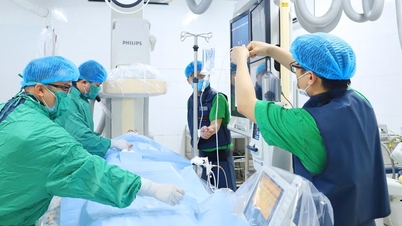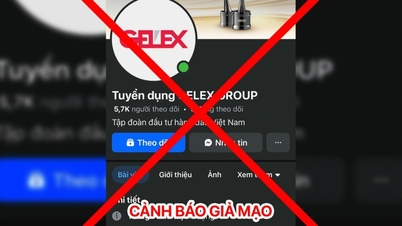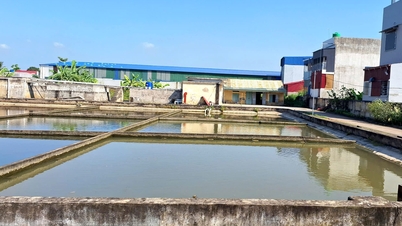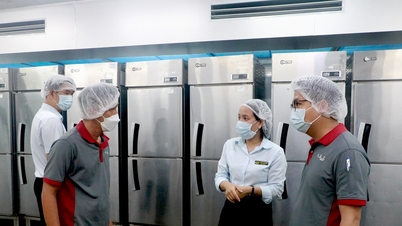Once a $6 billion company, at-home DNA testing company 23andMe filed for bankruptcy over the weekend.

Anne Wojcicki built the 'giant' 23andMe but also caused it to plummet - Photo: AFP
Before filing for bankruptcy, 23andMe had been on a long downward spiral, burning through more than $1 billion and laying off more than half of its staff. The board of directors resigned en masse in September because they disagreed with the company's management strategy under co-founder and CEO Anne Wojcicki.
The giant
According to the Wall Street Journal , Ms. Wojcicki is not ready to let go, declaring that she will seek to buy back the company.
The same optimism and “can do” belief that helped Ms. Wojcicki build a company that brought DNA testing to millions of people’s homes drove her to pursue costly strategies to exploit 23andMe’s data to develop drugs and provide health care, which ultimately failed.
Now, the odds are against Ms. Wojcicki. Her super-voting stock was stripped from her in bankruptcy court. Her previous bids to buy the company have been repeatedly rebuffed.
"Innovation in healthcare is incredibly difficult. 23andMe pioneered a completely different path, empowering individuals directly with access to important information about themselves, helping them think about genetic identity and personalized preventive care in a completely new way," said Ms. Wojcicki.
Wojcicki grew up in the heart of Silicon Valley, the daughter of the former head of Stanford University’s physics department. After graduating from college, she worked at financial firms, analyzing healthcare companies, and then co-founded the genetics startup now known as 23andMe with Linda Avey.
Initially, 23andMe struggled to attract interest in the test, which cost as much as $399 in 2008. To gain attention, the company held “saliva parties” at high-profile events like New York Fashion Week and the World Economic Forum in Davos, where celebrities spat into 23andMe test tubes to provide DNA samples.
Then, 23andMe dropped its price to $99, making it more accessible. Stories of customers discovering their lost siblings or biological parents sent 23andMe into a social media frenzy.
Sliding downhill
After going public in 2021, the company was valued at more than $6 billion, and CEO Wojcicki joked that it was “bigger than Google.” However, they still struggled to generate recurring revenue.
The difficulty with 23andMe since its inception is that customers usually only need to do a DNA test once in their lifetime, meaning they only pay once.
So Ms. Wojcicki began looking for new ways to monetize the company’s vast trove of genetic data. She raised more money and poured it into drug development to create breakthrough drugs. But this was risky, because bringing a new drug to market can take years and cost hundreds of millions of dollars.
Ms. Wojcicki then spent $400 million to buy telehealth company Lemonaid Health, hoping to use genetic reports to help guide patient care. That plan also failed, and Lemonaid’s revenue fell by half.
In 2020, Ms. Wojcicki launched 23andMe+, promising investors that millions of people would sign up. In reality, only a few hundred thousand customers actually joined.
As cash dried up, 23andMe instituted several rounds of layoffs in 2023. By April 2024, the company’s stock had fallen below $1. Ms. Wojcicki announced that she would take the company private, and with 49% of the voting power, she would block anyone from buying the company. However, two separate boards of directors rejected her proposal.
Immediately after the company filed for bankruptcy, 23andMe shares plunged 60%, to $0.73 on March 24.
Source: https://tuoitre.vn/su-sup-do-cua-ga-khong-lo-6-ti-usd-tung-tinh-lon-hon-google-20250327231223221.htm


![[Photo] General Secretary To Lam receives US Ambassador to Vietnam Marc Knapper](https://vphoto.vietnam.vn/thumb/1200x675/vietnam/resource/IMAGE/2025/9/29/c8fd0761aa184da7814aee57d87c49b3)
![[Photo] The 1st Congress of Phu Tho Provincial Party Committee, term 2025-2030](https://vphoto.vietnam.vn/thumb/1200x675/vietnam/resource/IMAGE/2025/9/30/1507da06216649bba8a1ce6251816820)
![[Photo] Solemn opening of the 12th Military Party Congress for the 2025-2030 term](https://vphoto.vietnam.vn/thumb/1200x675/vietnam/resource/IMAGE/2025/9/30/2cd383b3130d41a1a4b5ace0d5eb989d)
![[Photo] General Secretary To Lam, Secretary of the Central Military Commission attends the 12th Party Congress of the Army](https://vphoto.vietnam.vn/thumb/1200x675/vietnam/resource/IMAGE/2025/9/30/9b63aaa37ddb472ead84e3870a8ae825)































![[Photo] General Secretary To Lam attends the ceremony to celebrate the 80th anniversary of the post and telecommunications sector and the 66th anniversary of the science and technology sector.](https://vphoto.vietnam.vn/thumb/1200x675/vietnam/resource/IMAGE/2025/9/29/8e86b39b8fe44121a2b14a031f4cef46)


































































Comment (0)